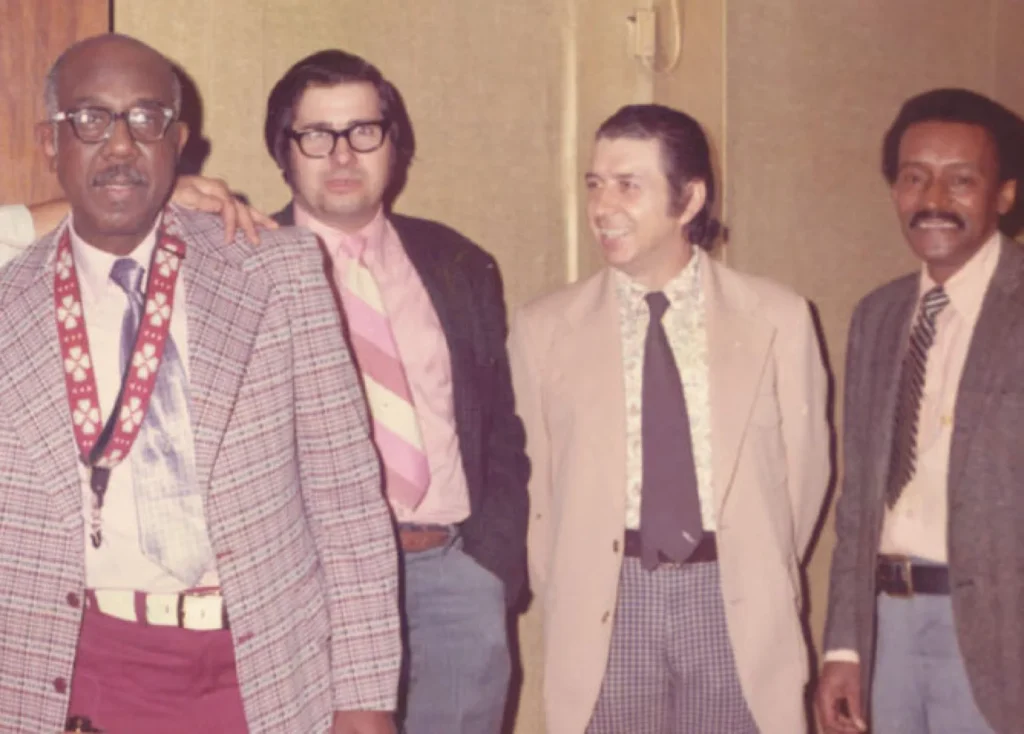
Three of the four gentlemen in this photo were guiding lights in my Worcester youth. Howie Jefferson (far left) was a great tenor player who could have been a contender on the national scene but chose to stay close to home and ply his trade at weddings and bar mitzvahs and GB gigs galore. When the Kitty Kat Lounge began hosting jam sessions on Thursday nights and Sunday afternoons in 1970, Howie’s big-toned soulfulness made him our main man on the bandstand. Howie was also a security guard, and when he heard I’d had words with a pistol-brandishing hustler (homies, remember Shorty G?) late on a Saturday night at the club, he assured me I was always welcome and that I should let him know if I had more trouble. Later on he brought me around to jazz hangs and parties with his peeps. I’ll never forget the subtle way he revealed to me that Duke Ellington had to stay in private quarters when he played Worcester in the ’20s and ’30s by simply stating what a thrill it was to see Duke “in silk bathrobe” enjoying breakfast on the second floor porch of a house across the street from Howie’s boyhood home in the city’s predominantly black Laurel-Clayton neighborhood.
On the right is Elwood “Bunny” Price, who played bass, was a silent partner in the Kitty Kat with drummer and emcee Reggie Walley, and hosted jazz radio shows at WICN. Bunny and his wife Betty also operated the Rib Crib restaurant below the Kitty Kat. Betty was Worcester’s first African American school committee member and the longtime director of Prospect House, the city’s black cultural and social service center. I felt honored whenever she asked me to host jazz history programs and film screenings there. Bunny’s father was trumpeter Elwood “Barney” Price, Sr., who co-led the Soul Jazz Quintet with Howie. His brother was Tom Price, who drummed on the New York scene beginning in the ’60s. I wrote about the Price family after Bunny’s death in 2014. Clickhere for “Bunny Price, R.I.P.”

To Bunny’s right is Bobby Gould, who played serious drums for many years with Howie, and on occasion with Boots Mussulli. The first time I heard Boots’s name was from Bobby, who told me of this legendary figure who toured with Stan Kenton in the ’40s and ’50s, and how Charlie Parker traveled from Boston to Boot’s home base at the Crystal Room in Milford, 15 miles southeast of Worcester, to sit in and hang out. Bobby ran Pro Drum Shop by day where he sold instruments and gave lessons, and he welcomed me on many afternoons after school for conversations about jazz. He was like the first cool cat I ever knew, and his name still stirs my heart. When he died in the late ’70s while playing a wedding gig at Holden Hills Country Club, Howie, who often addressed one-page typewritten letters to me about whatever was on his mind, headlined this sad bit of news, “Bobby Died at the Drums.”
Howie himself died in July 1981. I was cooking at the Lobster Pot in Provincetown that summer and whenever I needed a pack of cigarettes I’d walk across the street to Pilgrim Variety, where they carried about twenty daily newspapers for the summer crowd. I always picked up the Worcester Telegram, and one Monday morning was saddened to read below the fold on page one that Howard Jefferson had passed. Howie always signed off his letters, “Sax Man,” and for over 40 years, he was indeed the man with a horn for everyone in Central Massachusetts.
Al Mueller is to Howie’s left. I knew Al to be a fine pianist who taught at Clark University and as a regular at the Sunday jam sessions at the Hottentot Lounge. Whereas the Kitty Kat was on Main Street, the Hottentot was tucked away on cobblestoned Austin Street, which we thought of as Worcester’s Skid Row. The Hottentot spruced the block up a bit when it opened after the firebombing of the Kitty Kat, a crime that went unsolved but was assumed to be racist-driven. (There’s more about that in the post about the Prices.) For now I’m grooving on the happy recollection of these dedicated jazzmen who made the music live before downhome audiences that were wonderfully responsive to what they were putting down. I’ve only rarely seen that kind of interaction between performer and patron since then, and can easily inflate the memory to Proust-like proportions, but it’s all true!
